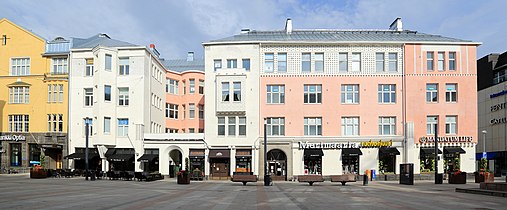| Valter Thomé | |
|---|---|
 Thomé in 1900 Thomé in 1900 | |
| Born | (1874-08-05)5 August 1874 Pudasjärvi, Grand Duchy of Finland |
| Died | 1 February 1918(1918-02-01) (aged 43) Vihti, Finland |
| Nationality | Finnish |
| Occupation | Architect |
Valter Thomé (5 August 1874 – 1 February 1918) was a Finnish architect who worked in the National Romantic or Art nouveau style.
Life and career
Born in Pudasjärvi and raised in Alajärvi, Thomé studied architecture at the Helsinki Polytechnic Institute, graduating in 1898. As a trainee, he worked in the offices of, among others, Lars Sonck, the firm of Grahn, Hedman & Wasastjerna, and Onni Törnqvist (later known as Onni Tarjanne). Like Sonck, he was an early proponent of the syncretic National Romantic style. After opening his first architectural practice in Tampere with August Krook, he later partnered in Helsinki with Karl Lindahl (1900–05), the Udd brothers (1909–12) and finally with his own brother Ivar (born 1882); the two of them were among the most successful architects in Finland in the early 20th century, designing numerous public buildings, business and industrial buildings and private villas. In addition, Valter Thomé collaborated with Bertel Jung and Sonck on what became an influential plan for the Töölö-Hietaniemi section of Helsinki; he later drew up city plans for Kotka, Savonlinna, Lappeenranta, Kristinestad, Naantali and Jyväskylä. In 1916, he was one of the highest-taxed individuals in Helsinki.


Valter Thomé and his brother won the architecture competition for Stockmann, Helsinki centre in 1916. The building was built in 1930, and the task was then given to Sigurd Frosterus who had been on the second place in the original competition.
Valter Thomé, his brother Ivar and a third brother, William, founder of the Thomesto Oy timber company, were shot by Reds in Vihti during the Finnish Civil War while trying to cross to the White side of the line. They were buried together in the New Cemetery in Helsinki. A fourth brother, the artist Verner Thomé, was not with them and survived.
Selected works
- (with Karl Lindahl) Oulu Market Hall (1901)
- Church, Perho
- (with Walter Thomé) Polytechnic Students' Union, also called the Sampo Building, Lönnrotinkatu 29, Helsinki (1903)
- (with Karl Lindahl) Headquarters of Otava publishing company, Uudenmaankatu 10, Helsinki (1905)
- Pallas Building, Kirkkokatu 8, Oulu (1907)
- Hovinsaari folk school, Kotka (1908)
- (with Udd Brothers) Flats, Annankatu 2, Helsinki (1911)
- (with Karl Lindahl) Headquarters of Suomi insurance company, Eteläesplanadi 2, Helsinki (1912), now headquarters of UPM
- (with Ivar Thomé) Varkaus town centre scheme (1913, revised 1917)
- (with Ivar Thomé), classical-style building with tile façade, Iso Roobertinkatu 25, Helsinki (1914)
- (with Ivar Thomé) Former Hotel Finlandia, Punkaharju (1914)
- Customs House, Kemi, now Kemi Gemstone Gallery
- Approximately 25 banks for Suomen Yhdyspankki (Föreningsbanken i Finland), including in Turku, Oulu, Raahe and Lappeenranta.
Gallery
-
Market hall, Oulu (1901)
-
 Vanha Poli, Polytechnic Students' Union building in Helsinki, 1903
Vanha Poli, Polytechnic Students' Union building in Helsinki, 1903
-
 Otava publishing company headquarters, Helsinki (1905)
Otava publishing company headquarters, Helsinki (1905)
-
 Pallas Building [fi] in Oulu (1907)
Pallas Building [fi] in Oulu (1907)
-
 Hovinsaari school, Kotka (1908)
Hovinsaari school, Kotka (1908)
-
Former bank, Oulu (1910)
-
 Suomi insurance company headquarters, Helsinki (1912)
Suomi insurance company headquarters, Helsinki (1912)
-
Customs House, Kemi (1912)
See also
References
- ^ Patrick Eriksson, "Thomé, Valter", Uppslagsverket Finland, retrieved 31 January 2013 (in Swedish)
- ^ Ivar Hortling, Valter Thomé: en minnesteckning (1919), abbreviated by Miika Kurkela, online at Valter Thomé, Raahe.info, retrieved 1 February 2013 (in Swedish)
- Jeremy Howard, Art Nouveau: International and National Styles in Europe, Critical introductions to art, Manchester/New York: Manchester University Press, 1996, ISBN 9780719041600, p. 178.
- "Arkkitehtiesittely Sigurd Frosterus" (in Finnish). Museum of Finnish Architecture. Archived from the original on 28 January 2015. Retrieved 8 January 2017.
- Walter Archived 28 January 2016 at the Wayback Machine, Ivar Alfred Archived 16 February 2016 at the Wayback Machine and William Gustaf Thomé Archived 28 January 2016 at the Wayback Machine at War Victims in Finland, 1914–1922, retrieved 31 January 2013 (in Finnish)
- Perhon seurakunta Archived 29 March 2012 at the Wayback Machine, Perho.com, retrieved 31 January 2013 (in Finnish)
- ^ T. Stz., "Lindahl, Karl Håkan Einar", Nordisk familjebok, Owl Edition, volume 37 Supplement: L – Riksdag, col. 197 (in Swedish)
- Valter Thomé, "Förlagsaktiebolagets Otavas hus i Helsingfors", Arkitekten Volume 6, issue 6, September 1908, pp. 79–80 (in Swedish)
- Helsinki, Espoo, Kauniainen, Vantaa: An Architectural Guide, ed. Arvi Ilonen, Suomen Rakennustaiteen Museo, tr. Laura Siilasvuo, Helsinki: Otava, 1990, ISBN 9789511107620, p. 57.
- Arkitekten Volume 5, Issue 4, April 1907, pp. 44–45 (in Swedish)
- Annankatu 2 Archived 30 January 2013 at the Wayback Machine at Korttelit.fi (in Finnish)
- Varkaus, List of nationally significant cultural and historical environments, 1993 (in Finnish)
- Helsingfors stads historia, ed. Eirik Hornborg, Volume 4, Issue 1, OCLC 29101397, Helsinki: unnamed publisher, 1957, p. 88 (in Swedish)
- Riitta Nikula, Yhtenäinen kaupunkikuva 1900-1930: suomalaisen kaupunkirakentamisaen ihanteista ja päämääristä, esimerkkeinä Helsingin Etu-Töölö ja Uusi Vallila, Bidrag till kännedom av Finlands natur och folk 127, Helsinki: Societas Scientiarum Fennica, 1981, ISBN 9789516531031, p. 51 (in Finnish)
- Finland, Eduskunta/Riksdagen, Handlingar Volume 1, Part 1, 1991, p. 133 (in Swedish)
- Hortling lists 22 locations but assigns them to three different banks.
Further reading
- Hortling, Ivar. Valter Thomé: En minnesteckning. Helsingfors: Söderström, 1919. OCLC 58264244 (in Swedish)
- Moorhouse, Jonathan & Carapetian, Michael & Ahtola-Moorhouse, Leena. Helsinki Jugendstil architecture, 1895–1915. Helsinki: Otava, 1987. ISBN 951-1-08382-1
- Paavilainen, Marko. Murhatut veljet: Valter, William ja Ivan Thomén elämä ja kuolema. Helsinki: Siltala, 2016. ISBN 978-952-234-337-6 (in Finnish)